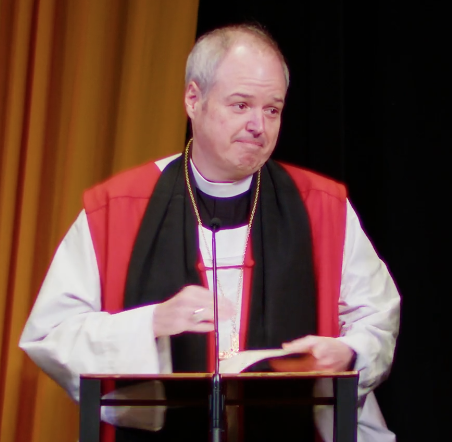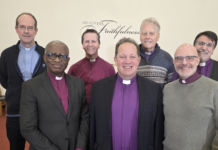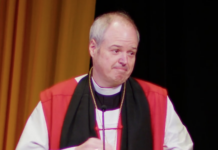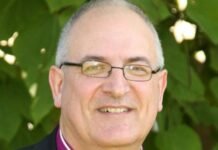June 28, 2024
The following is a transcript of a sermon delivered by Presiding Bishop-elect Sean Rowe during the June 28 Closing Eucharist service at the 81st General Convention of The Episcopal Church in Louisville, Kentucky.
It’s a great day in the Kingdom.
Now you have to imagine this scene. It’s not quite 25 years after the death and resurrection of Jesus Christ. The early church is struggling. The Apostle Paul is undertaking his third missionary journey to spread the Gospel across the world.
He lands in Ephesus, one of the most important cities in all of the Mediterranean, and then he proceeds to harangue the congregation for three months.
When he leaves the synagogue after three months—and you can imagine what that vestry meeting must’ve been like—he takes his followers to a lecture hall where they have daily discussion. We’re told in the Book of Acts that this goes on for two years, so that all the Jews and Greeks in the province of Asia heard the word of the Lord, or more likely they just said they did so he would stop talking. I don’t know.
Now, one of the remarkable things about this story of the early church in Ephesus is there are a lot of evil spirits and demons in that place. The power of evil seems to be present like it is in the world all the time. It is real. They’re possessing people to become violent. They’re generally wreaking havoc. Practitioners of magic seem to be everywhere in Ephesus. What in the world is going on?
It turns out that the temple of the goddess Artemis was in that place, and Paul’s sermons were really messing with the economy of the place. The people who benefited from this goddess’ temple were very unhappy. They were uncomfortable, so uncomfortable that when Paul was talking, there was a riot in the amphitheater. And instead of leaving, Paul wants to do what Paul likes to do, which is talk some more.
Paul is sort of part beautiful mystic—he really is—and then just pedant. But after encouraging his disciples, he leaves the town because the disciples step in and kind of rescue the day; he leaves town bound for Macedonia. And I’ll bet it was the kind of sigh of relief that everyone breathes when the bishop drives out of the parking lot after the visitation. See you in 18 months. Let us know if you need anything. But Paul being Paul, just keeps talking, just keeps bringing the Good News, just keeps bringing the word of God even when people are recalcitrant. Thankfully, we don’t know anything about that.
That’s how we get to today’s reading. We can tell from the passage that the magic and the spiritual forces are all very much at play, and they’re all on Paul’s mind. So he wants them to imagine themselves suiting up for battle. He tells them to put on the whole armor of God: breastplates, helmets, shoes, belts, the equipment of might and power in the Roman Empire, which may sound a bit uncomfortably martial to our ears, but you can imagine how it fell on theirs—probably landed on it very differently.
Now, I went to a good evangelical college. I can tell you that this passage has a lot of currency when it comes to individual spiritual warfare, which is real. The powers of evil are real in the world. We are living in a world where these are very much alive. This Scripture was often interpreted as encouragement to individuals to fight against that. And that’s a good thing, and far be it from me to discourage us from fighting against temptation.
But there is another meaning in this passage I think for us now in this time in The Episcopal Church where we are right now. Like the church in Ephesus, we’re small, countercultural. We’re not struggling to survive in the cult of Artemis, but there are other cults in our midst.
We are standing firm in the face of those. We’re holding fast to our promise to uphold the full inclusion of LGBTQI+ persons as children of God. We’re proclaiming and investing in our longing to become a Beloved Community. We’re committing to caring for God’s creation and respecting the dignity of every human being.
And we are not backing down in our proclamation of the Gospel just because other people who understand it differently are bigger or think they’re more powerful or louder or have a vision that denies humanity.
At the beginning of this liturgy, we prayed the collect for the commemoration of the great author and activist James Weldon Johnson. In it, we asked God for the strength to “speak with joy and boldness to banish hatred from your creation.” That was Johnson’s struggle, and it is one of ours.
Johnson understood that the spiritual warfare that was taking place in that day was not an individual one only, but a war that the people of God were fighting against the evil of racism and the legacy of chattel slavery.
“We have come treading our path through the blood of the slaughtered” is not a metaphor, and the battle is not yet won. Friends, to continue that righteous struggle, we must arm ourselves against the forces within us: the way we intellectualize our avoidance of a true reckoning with racism; our internal strife that divides us from one another and depletes our capacity to proclaim the love of God in Christ to the world. What’s up with that? That’s a problem. If we can’t figure it out in here, how are we supposed to carry it out to the world? How about our attachment to the old ways that no longer serve us?
And finally, what about our idolatry of structures and practices that exclude and diminish our witness? We have to get it together. That’s going to mean laying some things down. The struggle ahead will require a tolerance for uncertainty, a willingness to make real sacrifices. We’ll actually need to let go of some of our grievances and hold more lightly our beliefs about how the church should work and who has a voice.
And we must learn to have hard conversations with each other, with love and respect, so that we’re all pulling in the same direction: the transformation of the world by the Gospel of Jesus Christ.
Now, this is a tall order, and yet in the work that lies ahead, we have what we might call an armor of love that will help us withstand whatever comes our way, because, thanks be to God, the church in our day has been given Michael Bruce Curry. His ministry is incomparable.
And through our brother Michael, God has shown us again what the power of love can do to transform the world around us. One of his schoolteachers in an all boys’ classroom, Mr. Saunders, told him that a gentleman is always ready to speak a word. I think he took that seriously.
He has guided us in a struggle against racism and the wicked forces that divide us and given us the gift of his powerful and prophetic preaching to sustain us. In the words of James Weldon Johnson, he has brought us thus far along the way.
Now Michael’s Curry’s legacy of love and the love of God in Jesus Christ—this legacy is ours. And to steward and share it, we must hammer out the dents in the armor; refasten the belt of truth; make our dioceses and congregations stronger; collaborate for the sake of the Gospel; counter division and injustice in our communities, all with the witness to the risen Christ.
Let us go forth from here in the name of Christ, with thanksgiving for the witness of Michael Curry, the power of God working in Him and us, his example, and the love of Jesus Christ our savior. Sustain us on our journey.
Amen.



